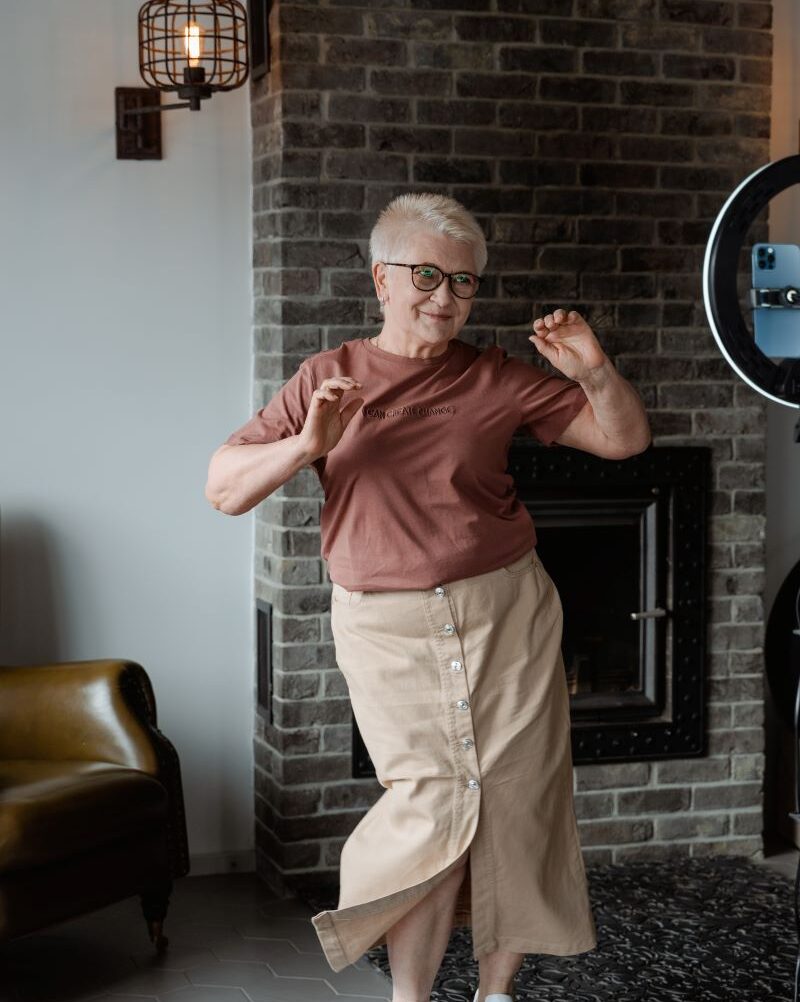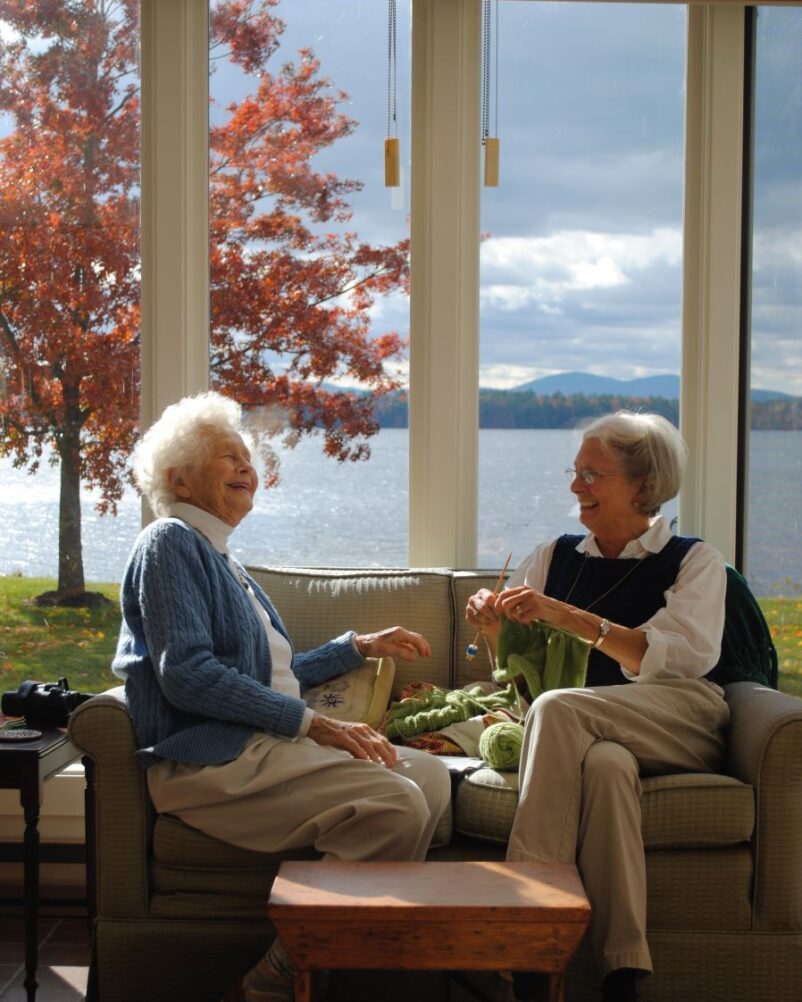
As we age, our physical health becomes a primary concern. People are always talking about staying active through walking and other activities. However, aging and mental health should also be given equal attention.
Older individuals are more prone to developing mental illnesses due to several factors such as declining health, social isolation, and life changes like retirement and loss of loved ones.
Aging and mental health disorders can have a detrimental impact on seniors’ quality of life, if not addressed.
The Importance of Positive Aging and Mental Health
Mental health is important for people of all ages, but it is especially so for aging gracefully. As individuals age, they become more susceptible to mental health issues such as depression, anxiety, and dementia.
Mental health problems can significantly impact an older individual’s quality of life and ability to function independently.
One reason aging and mental health considerations are so essential is that they impact a person’s physical health as well.
For example, depression can lead to a lack of appetite or motivation to exercise, which can cause weight loss and muscle weakness. Or, the opposite can be true and a person gains too much weight, which presents another set of physical health issues.
Additionally, untreated mental illnesses can increase the risk of developing chronic conditions like cardiovascular disease or diabetes. The opposite is true as well. Concerns with aging and physical health adversely affects a person’s mental health.
Aging and mental health is also something that adversely impacts social relationships. Seniors who are struggling with mental illness may isolate themselves from friends and family members because they do not want to burden them with their problems.
This isolation can lead to feelings of loneliness and further deteriorate mental health. The key is to prioritize mental wellness as a way to ensure better overall well-being and healthier aging processes.
Common Aging and Mental Health Issues
- Depression affects approximately 6 million seniors in the United States. Depression can manifest in various ways, including feelings of sadness, isolation, and hopelessness.
If left untreated, depression can lead to physical symptoms such as fatigue and chronic pain. - Anxiety disorders affect over 3 million seniors in the US and can be triggered by life changes such as retirement or health problems.
Symptoms of anxiety include excessive worry, restlessness, and difficulty sleeping. Chronic anxiety can also lead to physical symptoms such as high blood pressure and heart disease.
- Cognitive decline is a big concern. Dementia affects nearly 6 million Americans aged 65 or older, and this number is expected to double by the year 2050.
Alzheimer’s disease is one form of dementia that causes memory loss and cognitive impairment that worsens over time. Seniors with dementia require specialized care to manage their condition effectively while maintaining their quality of life as much as possible.
Some common symptoms of aging and mental disorders include:
- Changes in mood or behavior
- Confusion or disorientation
- Memory loss
- Sleep issues; either too much or too little
- Anger and irritability
- Difficulty concentrating or making decisions
- Increased anxiety or worry
- Obsessive and/or compulsive behavior
- Talk of suicide
- Obsession about death
- Physical pains such as digestive or headaches that seem to be all the time
- Decreased interest in activities they once enjoyed
- Fatigue
- Lack of engagement with friends and loved ones
Other signs of mental illness may include difficulty managing daily tasks like cooking or cleaning, neglecting personal hygiene and appearance, and social withdrawal or isolation.
 Individuals may be reluctant to seek help for their aging and mental health concerns due to stigma around mental illness or fear of being seen as weak.
Individuals may be reluctant to seek help for their aging and mental health concerns due to stigma around mental illness or fear of being seen as weak.
It’s important for seniors experiencing these symptoms to seek help from a mental health professional who can provide support through counseling or medication management if necessary.
Often, it takes assistance and support by family members and caregivers in identifying potential warning signs to get the support needed.
Additionally, attending church, participating in social activities such as community events or joining clubs/organizations with shared interests can help alleviate loneliness while promoting overall well-being.
Risk Factors for Aging and Mental Health
The risk factors for poor mental health among seniors are numerous. One of the most common is social isolation, which can lead to depression and anxiety.
As seniors age, they may find it more difficult to maintain social connections due to physical limitations or the loss of friends and family members.
Another risk factor for poor aging and mental health in seniors is chronic illness. Conditions like dementia, Parkinson’s disease, and stroke can cause significant changes in a person’s cognitive abilities and mood.
These changes can be challenging for seniors to cope with on their own.
Finally, financial insecurity is another significant risk factor for poor aging and mental health among seniors.
Older adults who struggle to make ends meet may experience high levels of stress and anxiety as they worry about how they will pay for basic necessities like food and housing.
This stress can exacerbate existing mental health conditions or even lead to new ones.
Strategies for Maintaining Good Mental Health
As seniors, maintaining good mental health is crucial to promoting overall well-being and quality of life.
 One strategy for doing so is staying socially connected with friends, family members, and community groups. Seniors should make an effort to maintain a regular schedule of social activities they enjoy, such as taking cooking classes or participating in a book club.
One strategy for doing so is staying socially connected with friends, family members, and community groups. Seniors should make an effort to maintain a regular schedule of social activities they enjoy, such as taking cooking classes or participating in a book club.
Another important strategy for maintaining good mental health is practicing self-care.
This can include getting enough restful sleep each night, eating a healthy diet rich in fruits and vegetables, engaging in physical exercise regularly, and taking part in enjoyable hobbies or activities.
Seniors may also benefit from meditation or other forms of relaxation techniques that help reduce stress levels.
By prioritizing self-care habits that promote overall wellness, seniors can better manage their mental health on a daily basis.
The Role of Family and Caregivers with Aging and Mental Health
Family and caregivers play a crucial role in supporting the mental health of seniors.
As individuals age, they are at an increased risk for developing mental health conditions such as depression and anxiety.
Family, friends, and caregivers alike can help by providing emotional support, encouraging healthy habits, and connecting seniors with mental health resources.
In addition to providing emotional support, caregivers can also assist with daily tasks that may feel overwhelming for seniors struggling with their mental health.
For example, preparing healthy meals or assisting with medication management can help reduce stress and improve overall well-being.
It’s important to recognize that caregiving can also have an impact on the mental health of those providing care.
It’s essential for caregivers to prioritize their own self-care needs to avoid burnout and maintain their ability to provide effective support for their loved ones.
Seeking out caregiver support groups or therapy services can be beneficial in managing the challenges and demands of caregiving while maintaining good mental health.
Resources for Help
There are a variety of resources available to help seniors with their mental health.
One potential resource is therapy, which can provide seniors with a safe space to discuss and work through their emotional struggles. Additionally, various support groups exist for seniors who have experienced loss or are dealing with chronic illnesses.
For those who cannot afford therapy or support groups, there are also free resources available such as hotlines and online forums where individuals can connect with others who are going through similar experiences.
Some organizations even offer free counseling services specifically for older adults. Another resource is community centers which often host events and activities that promote social engagement and improve mental health.
Overall, it’s important for seniors to know that they don’t have to struggle with their mental health alone. With the right resources and support systems in place, they can receive the help they need to maintain good mental health well into old age.
Mental Health Professionals and Support Groups
Mental health professionals and support groups are essential resources for seniors facing mental health challenges.
 These professionals can provide seniors with the necessary guidance and treatment to cope with mental health disorders such as depression, anxiety, and dementia.
These professionals can provide seniors with the necessary guidance and treatment to cope with mental health disorders such as depression, anxiety, and dementia.
They may also offer counseling services that help seniors deal with grief, loss, or loneliness.
Support groups provide a safe space for seniors to share their experiences and connect with others who are going through similar struggles.
This can be especially helpful for those who feel isolated or misunderstood by family members or friends.
Support groups often focus on specific issues like addiction recovery, caregiving, or chronic illness management. These groups can provide valuable emotional support and practical advice to help seniors manage their conditions effectively.
Mental health professionals and support groups play a vital role in helping seniors maintain good aging and mental health. With their expertise and understanding, they can guide older adults towards effective coping strategies that improve their quality of life.
Seniors should not hesitate to reach out for help when they need it – there is always someone ready to listen and offer support!
Senior Mental Health Hotlines
As seniors age, they may be faced with new challenges related to their physical and mental health. While there are many resources available to support older adults, it can be difficult to know where to turn for help.
One option is to call a senior health hotline, which can provide information and assistance on a range of topics.
One such hotline is dialing 988 universal suicide prevention hotline , which offers confidential support for individuals who are feeling overwhelmed or hopeless.
The line is staffed by trained counselors who can provide crisis intervention as well as referrals to local resources.
Another helpful resource is the Elder Abuse Hotline, which provides information and support for seniors who are experiencing abuse or neglect.
In addition to these hotlines, there are also many organizations that offer specialized services for seniors with mental health concerns.
For example, the Alzheimer’s Association offers a 24/7 helpline staffed by licensed social workers who can provide information and support for individuals living with dementia as well as their caregivers.
By taking advantage of these resources, seniors can receive the help and support they need to maintain their physical and mental wellbeing in later life.
Questions or comments? Contact us!
Written by
Robin McClure
Robin is the author of 7 parenting books and has 3 grown children, 3 spoiled rescue dogs, and a very understanding husband. She holds a bachelor's degree in journalism and a master's degree in communications, and spends her time writing, drinking coffee, and planning the next grand adventure.




[…] of the most important aspects of aging gracefully is staying mentally active. As we age, our cognitive abilities may begin to decline. However, by engaging in mentally […]
[…] getting regular exercise and staying socially connected can all help improve overall health and mental […]
[…] circumstances can vary greatly. But the idea that aging automatically leads to a sour mood or poor mental health is simply untrue for most […]
[…] Stress is often a result of work-related pressure or other commitments that come with having a full-time job. By retiring, individuals can decrease the amount of stress in their lives which leads to better mental health. […]